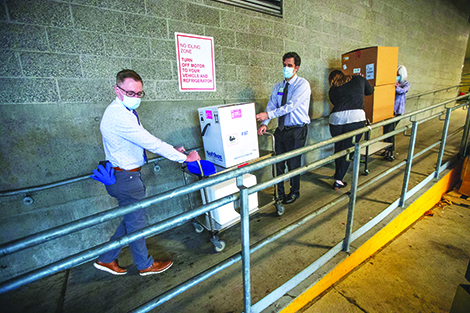2020 ended with vaccines against coronavirus, with the first doses going to healthcare workers who treat COVID-19 patients, other healthcare workers, and elderly residents of long-term facilities.
Arrival and distribution of the vaccine in Washington came on the heels of the federal Food and Drug Administration authorizing emergency use of one developed by the drug manufacturer Pfizer. The decision was finalized Dec. 10. After that, a pact of health experts representing Washington, Oregon, California, Nevada and Colorado met and formally approved use of the vaccine in their states.
A second vaccine, this one developed by Moderna, also was approved by federal and state authorities and was scheduled to begin arriving in Washington by the end of December.
The Pfizer vaccine, the first one available in the U.S., is given in two doses 21 days apart. The first shots for Washingtonians were expected to be given in mid-December.
State Department of Health officials said the federal government gave Washington approximately 62,400 doses of the Pfizer vaccine “for our initial allocation. They have also told us we should receive an estimated total of around 200,000 doses by the end of December,†followed by regular weekly shipments of the vaccine to Washington beginning in January.
The vaccine is intended to stimulate the production of antibodies for immunity against COVID-19, which began ravaging the U.S. in early 2020. The death toll nationally was approaching 300,000 nationally and topped 3,000 in Washington by December.
Efforts to control the spread of the virus remain critical while the vaccine is slowly reaching the population, Governor Jay Inslee said.
“What we do between now — when COVID activity is still at crisis levels — and the time when vaccines are widely available, is literally a matter of life and death,†Inslee said Dec. 8 while announcing three more weeks of restrictions on businesses and gatherings.
The state health department shared the following common questions and its answers about progress on the vaccine:
When will Washington have a vaccine?
We are hopeful we will have a vaccine to begin administering by mid-December, but the date is still uncertain. Availability will depend on the results of several different COVID-19 vaccines.
Will everyone be able to get the vaccine?
When a vaccine for COVID-19 is available, we will not have enough at first to offer it to everyone. We will have to make tough decisions about who gets the vaccine first. Eventually there will be enough vaccine for everyone who wants it. What we know for sure is that the first phase of vaccination will focus on workers in healthcare settings that serve patients with confirmed or suspected COVID-19, along with staff and residents of long-term care facilities. We’ll know more about who will be vaccinated in later phases based on input and decisions made by the national Centers for Disease Control (CDC). Getting vaccine to the people is a large, coordinated effort, and the timeline for all eligible people to receive the vaccine will take many months to understand.
Can any pharmacy, clinic or hospital offer the vaccine?
To receive and administer the vaccine and supplies, providers must enroll in a federal vaccine distribution program, coordinated through the state immunization program (unless they are part of a national chain that registered directly with the CDC). The federal government will procure and distribute the vaccine at no cost to enrolled providers.
Long-term care facilities can also enroll in a program that will provide vaccine for their residents and staff. On Oct. 16, the White House announced a federal partnership with CVS and Walgreens to administer the vaccine to residents in long-term care facilities when available. (Pariticipation by such facilities) is critical to ensure their vulnerable residents are among the first to receive a vaccine.
How much will it cost to get vaccinated?
The federal government will cover the cost of the vaccine. Healthcare providers may charge an office visit fee, or a fee to give the vaccine. Health insurance most likely will cover these fees. We’re working with other state agencies to address people who don’t have health insurance.

Photographed on December 14, 2020.